39 stata rename variables
libguides.library.nd.edu › data-analysis-stata › loopsLoops - Data Analysis with Stata - Library Guides at ... Dec 02, 2020 · rename `v' `v'_78} The utility of looping becomes more obvious if we suppose that you need to rename ALL the variables in this dataset. If there are 100 variables, entering the rename command 100 times quickly becomes tedious. Here's how to add the suffix "_78" to all the variables in this dataset using a loop: foreach v in * { rename `v' `v'_78} Renaming Variables in Stata - The Rename Command - Techtips 11.8.2017 · Sometimes when you import a new dataset or create a new dataset you realise that the variable names are not appropriate for the work you are doing. Perhaps they do not match the variables in another dataset that you want to merge in, or the names may just be long and cumbersome to type. To address this problem Stata has the rename command. This …
wlm.userweb.mwn.de › Stata › wstavartStata Guide: String Variables From string to numeric variables. Even though Stata can handle string variables, it is clear in many respects that numeric variables are much preferred. Not least, most statistical procedures just do not accept string variables. Fortunately, Stata offers some easy ways for converting string to numeric variables (and vice versa). "String only ...

Stata rename variables
Stata Guide: Display Format Formats for numeric variables. The format of a variable is displayed when you describe the variable. Alternatively, you may just write. format v17. to obtain the format of, e.g., v17. There are two basic formats for numeric variables, which will be described shortly; other, very special formats (exponential, binary, hexadecimal) are not ... Stata Guide: String Variables As an example, the (German) word für is a string of length three in Stata 13, but the string length is four in Stata 14. This also influences the results of functions such as strlen() . As strlen() refers to the memory used (and not the number of characters as they appear on the screen), the result of strlen(für) will also be 4 in Stata 14 in contrast to 3 in Stata 13. › post › renamingRenaming Variables in Stata - The Rename Command - Techtips Aug 11, 2017 · Sometimes when you import a new dataset or create a new dataset you realise that the variable names are not appropriate for the work you are doing. Perhaps they do not match the variables in another dataset that you want to merge in, or the names may just be long and cumbersome to type. To address this problem Stata has the rename command. This command can be used to change the name of a ...
Stata rename variables. stylizeddata.com › how-to-rename-variables-rHow to Rename Variables in R – Stylized Data Mar 19, 2022 · I want to show you how to rename variables in R. This is a basic task but one that I do frequently when working with a new dataset. Renaming variables is useful, especially when creating graphics. For example, if I were plotting these data, I would want the variable name to show as “Coffee Roast” rather than “coffee.” Title stata.com rename group — Rename groups of variables 4rename group— Rename groups of variables rename *stat stat#, renumber sort: Renames, for instance, aprstat to stat1, aug-stat to stat2, :::. 18. rename (a b c) v#, addnumber: Renames a to v1, b to v2, and c to v3. Rule 18: The addnumber option allows you to … Loops - Data Analysis with Stata - University of Notre Dame 2.12.2020 · A guide to using Stata for data work. foreach is used to loop through essentially a list of words. Load the example dataset auto.dta using the sysuse command:. sysuse auto, clear. Suppose you want to rename the variables price and mpg to price_78 and mpg_78 respectively. You could of course type the rename command as many times as you need (in this case it … › manuals13 › drenamegroupTitle stata.com rename group — Rename groups of variables 4rename group— Rename groups of variables rename *stat stat#, renumber sort: Renames, for instance, aprstat to stat1, aug-stat to stat2, :::. 18. rename (a b c) v#, addnumber: Renames a to v1, b to v2, and c to v3. Rule 18: The addnumber option allows you to add numbering. More formally, if you
› manuals13 › drenamerename — Rename variable - Stata rename old varname new varname Menu Data > Data utilities > Rename groups of variables Description rename changes the name of existing variable old varname to new varname; the contents of the variable are unchanged. Also see[D] rename group for renaming groups of variables. Remarks and examples stata.com Example 1 rename allows you to change ... How to Rename Variables in SAS (With Examples) - Statology 28.12.2021 · Example 2: Rename Multiple Variables. The following code shows how to rename both the x and y variables in the dataset. Note that you don’t need to include commas in between the new variable names. /*rename multiple variables*/ data new_data; set original_data (rename =(x=new_x y=new_y)); run; /*view new dataset*/ proc print data=new_data; rename — Rename variable - Stata rename old varname new varname Menu Data > Data utilities > Rename groups of variables Description rename changes the name of existing variable old varname to new varname; the contents of the variable are unchanged. Also see[D] rename group for renaming groups of variables. Remarks and examples stata.com Example 1 rename allows you to change ... How to Rename Variables in R – Stylized Data 19.3.2022 · I want to show you how to rename variables in R. This is a basic task but one that I do frequently when working with a new dataset. Renaming variables is useful, especially when creating graphics. For example, if I were plotting these data, I would want the variable name to show as “Coffee Roast” rather than “coffee.”
Stata Basics: foreach and forvalues - University of Virginia 14.10.2016 · Rename multiple variables. Take the temperature dataset we created as an example. Let’s say we want to rename variables mtemp1-mtemp12 as mtempjan-mtenpdec. We can do so by just tweaking a bit of the codes in the previous example. Define local macro mcode and month, then rename the 12 vars in the foreach loop. NCES | Online Codebook - Create Syntax Begin by adding 1 or more variables to create a syntax file. A syntax file helps you to load data files into the statistical software of your choice by importing your selected variables. Certain IDs and weights will be automatically added to your syntax if … › sas-rename-variablesHow to Rename Variables in SAS (With Examples) - Statology Dec 28, 2021 · The following code shows how to rename both the x and y variables in the dataset. Note that you don’t need to include commas in between the new variable names. /*rename multiple variables*/ data new_data; set original_data (rename =(x=new_x y=new_y)); run; /*view new dataset*/ proc print data=new_data; Example 3: Add Prefix to All Variables › post › renamingRenaming Variables in Stata - The Rename Command - Techtips Aug 11, 2017 · Sometimes when you import a new dataset or create a new dataset you realise that the variable names are not appropriate for the work you are doing. Perhaps they do not match the variables in another dataset that you want to merge in, or the names may just be long and cumbersome to type. To address this problem Stata has the rename command. This command can be used to change the name of a ...
Stata Guide: String Variables As an example, the (German) word für is a string of length three in Stata 13, but the string length is four in Stata 14. This also influences the results of functions such as strlen() . As strlen() refers to the memory used (and not the number of characters as they appear on the screen), the result of strlen(für) will also be 4 in Stata 14 in contrast to 3 in Stata 13.
Stata Guide: Display Format Formats for numeric variables. The format of a variable is displayed when you describe the variable. Alternatively, you may just write. format v17. to obtain the format of, e.g., v17. There are two basic formats for numeric variables, which will be described shortly; other, very special formats (exponential, binary, hexadecimal) are not ...
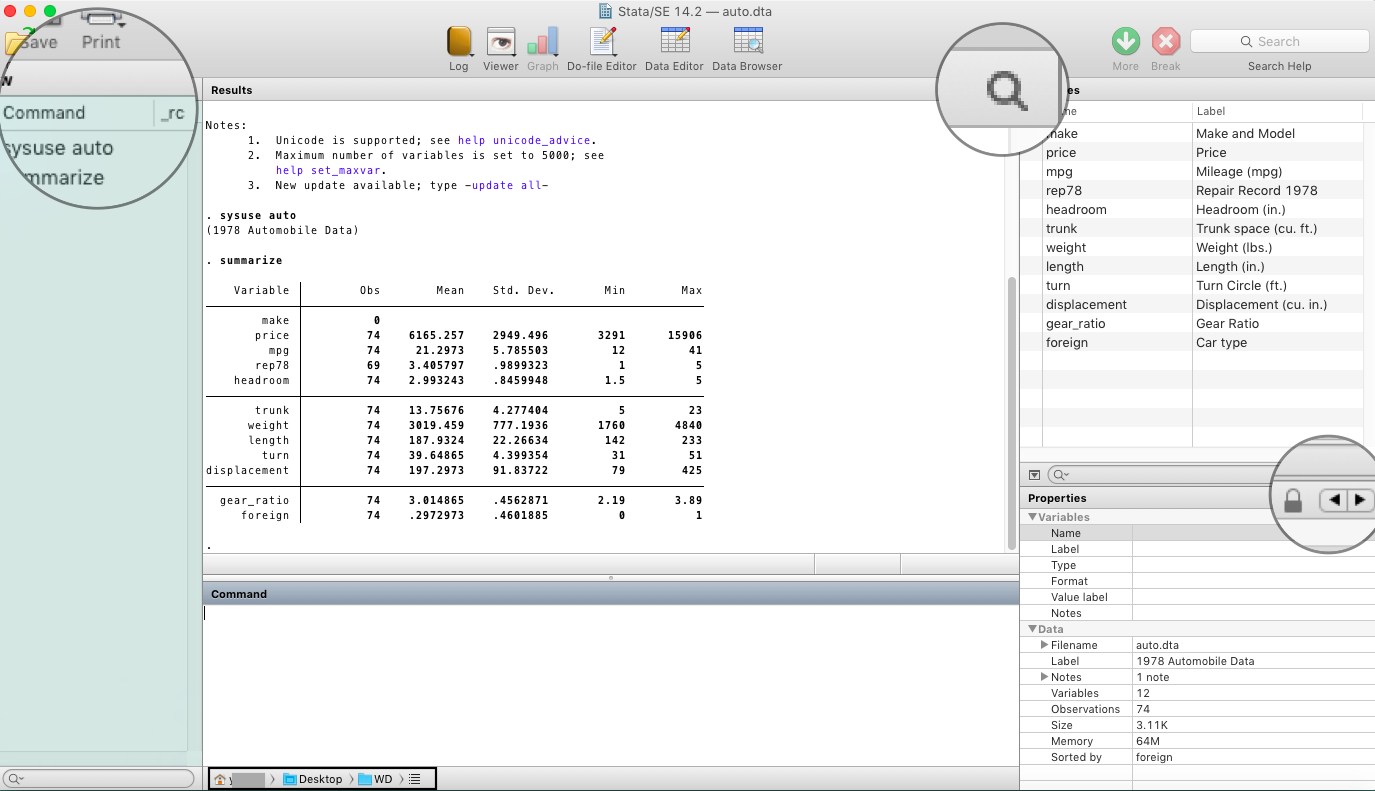
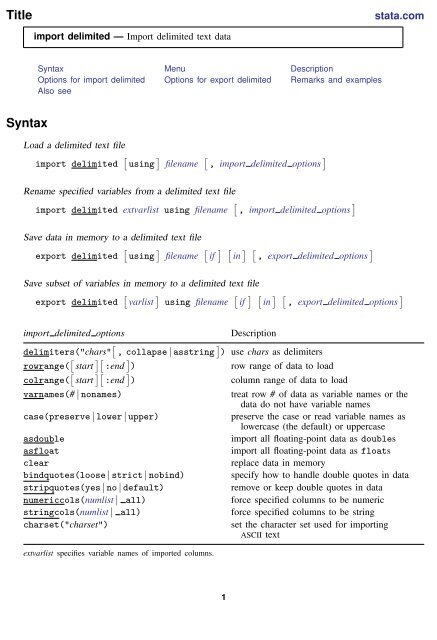



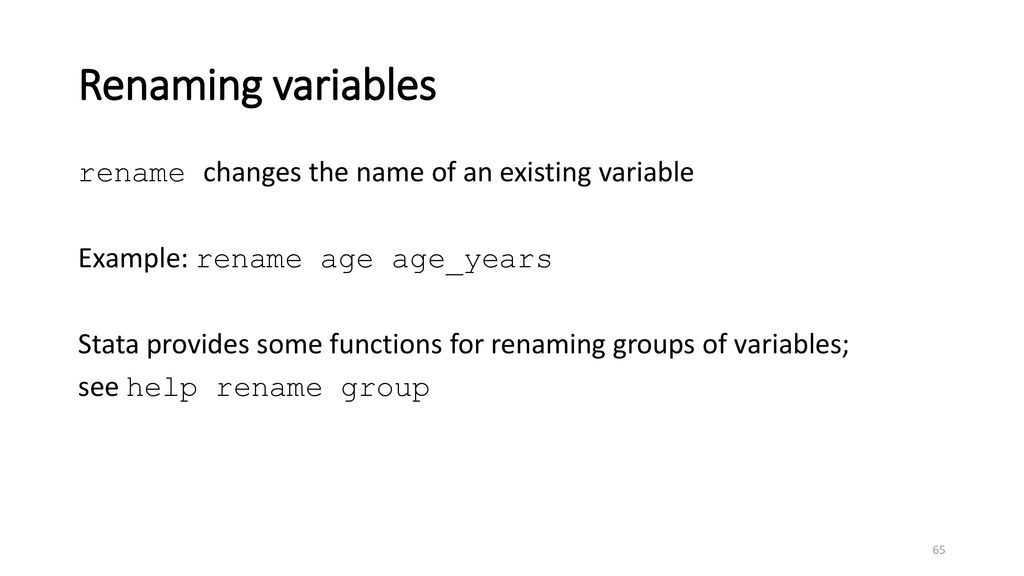




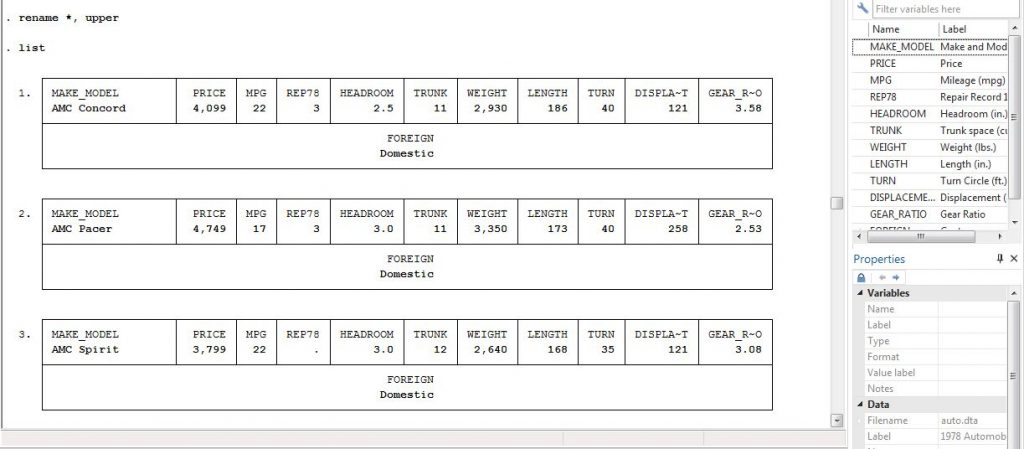
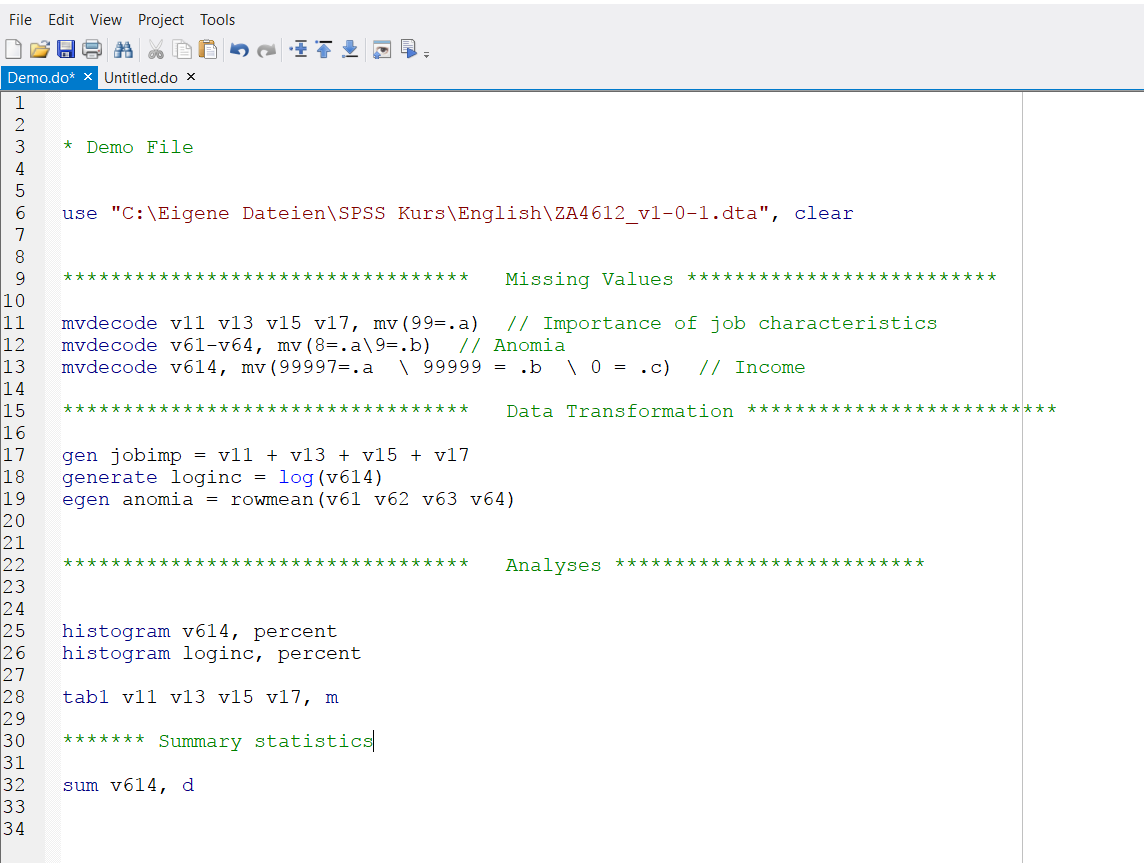
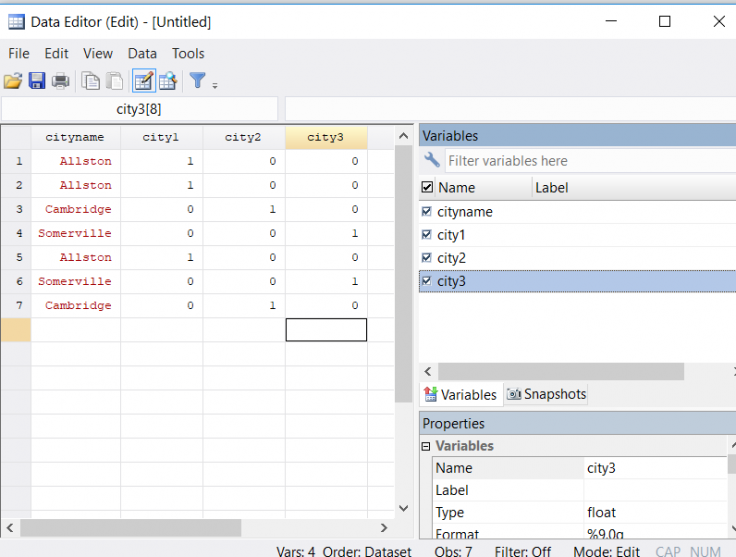

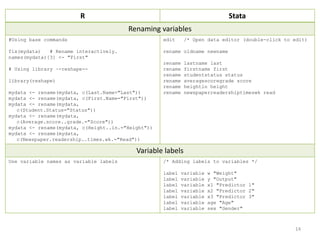

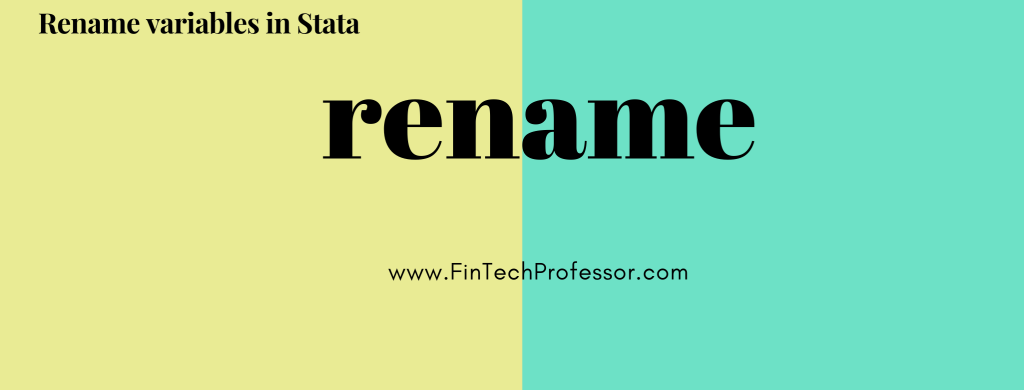

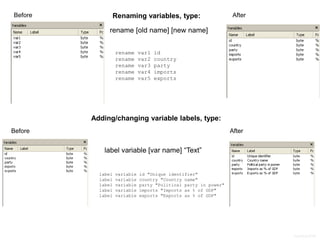
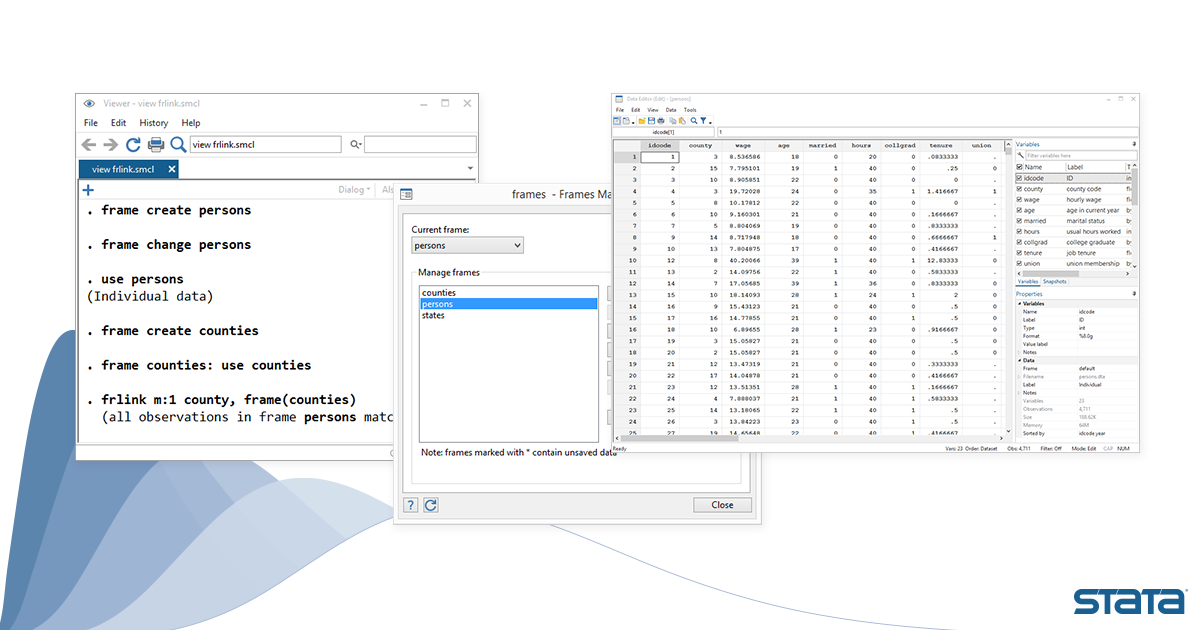


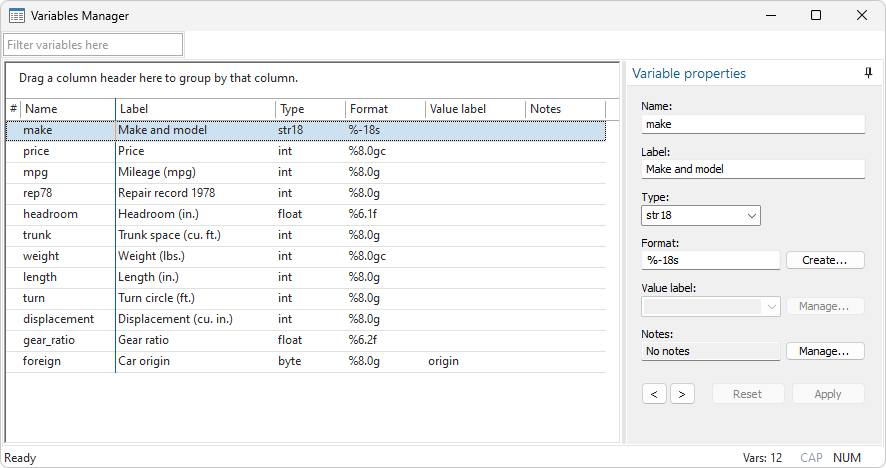
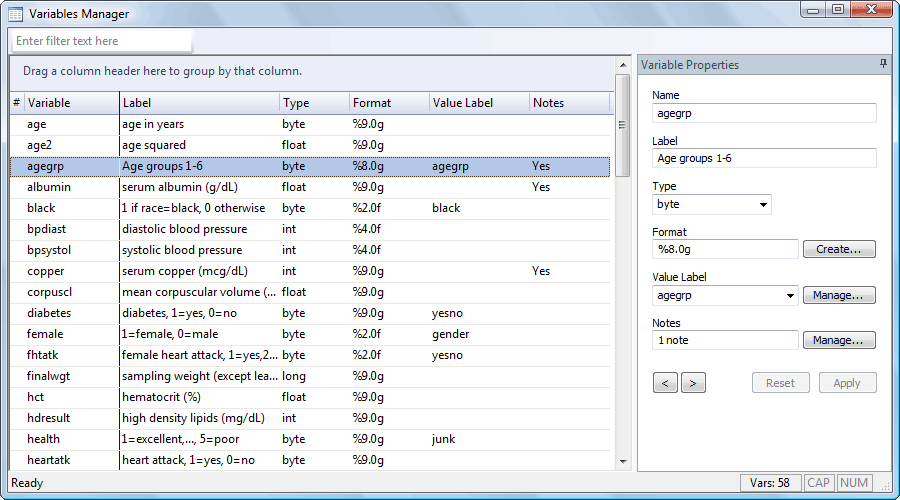


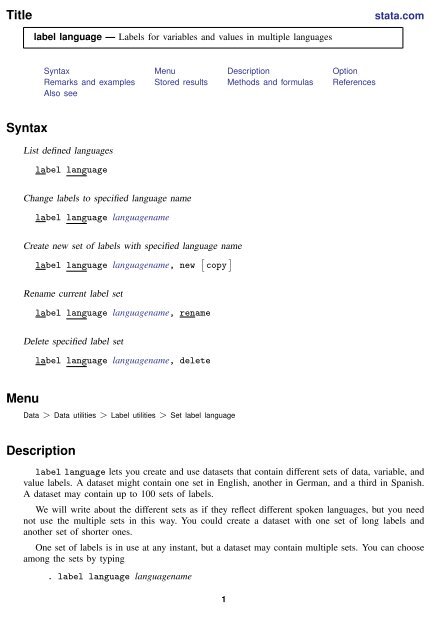

Post a Comment for "39 stata rename variables"